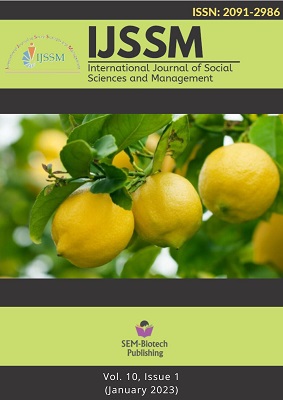Influence of Caste, Education and Family on Women’s Participation in Village Panchayats of Uttarakhand with special reference to Ukhimath and Raipur Block
DOI:
https://doi.org/10.3126/ijssm.v10i1.51962Keywords:
Women Leadership, Social factors, Village PanchayatAbstract
Women’s leadership and their effective participation is increasingly on the development agenda of governments. The gender mainstreaming and active involvement of women, who constitute almost 50 percent of population, is very crucial for the development of the rural areas. Women are still disadvantaged due to their limited access to land, credit, technology and resources. Rural women are economically backward. Poverty, illiteracy and caste are the factors affecting the social, economic and political development of woman.
Affirmative action to ensure women’s participation in politics is an important step in democratising and engendering local governance. However, it has not been adequate to ensure women’s leadership and their effective participation in local governance, as elected women representatives. At the institutional level, the capacity of local governance structures to implement reforms, institutionalize accountability systems, decentralise functions and facilitate women’s active engagement plays a role in determining whether women are able to emerge as political actors. Social barriers include lack of education, lack of respect for women in PRIs, physical violence against women in public and domestic spheres and oppressive patriarchal and caste structures. In this paper effort has been made to analyse and understand influence of some of social factors, like caste, education and family on women’s participation in village panchayat of Uttarakhand.
Int. J. Soc. Sc. Manage. Vol. 10, Issue-1: 5-9.
Downloads
Downloads
Published
How to Cite
Issue
Section
License
Copyright (c) 2023 International Journal of Social Sciences and Management

This work is licensed under a Creative Commons Attribution-NonCommercial 4.0 International License.
This license enables reusers to distribute, remix, adapt, and build upon the material in any medium or format for noncommercial purposes only, and only so long as attribution is given to the creator.




